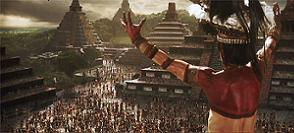Neil Labute is not a writer of tragedy in the classic sense, because tragedy requires a genuine hero, and Labute’s characters inspire only disdain. But his films and plays are undeniably tragic–“In the Company of Men,” “Your Friends and Neighbors,” “Bash,” and others feature misogynists, rapists, adulterers, and bigots, and most of them don’t feel a smidge of guilt about their depraved ways. That’s what’s tragic about the world of Labute–his characters aren’t just without morals; they’re without remorse.
With “Wrecks,” a play that opened last month in New York City with Ed Harris in the lead–and only–role, Labute has combined classic tragedy with, well, Labutian tragedy. The entire production is set in a funeral parlor, where Edward Carr is mourning the death of his wife, Jo-Jo. She sits behind him in a closed casket; he paces back and forth in front of her, monologuing to the audience about his lost love. As he does, “Wrecks” opens upon several puns: Carr and his wife ran a classic car rental business; though they were involved a major auto wreck one time, Jo-Jo’s life is eventualy wrecked by cancer.
And then there’s the titular pun. Some reviewers have called “Wrecks” a play with a dramatic twist, but a twist only works if you don’t see it coming. Given that (1) the play is called “Wrecks” and (2) we learn soon after the play opens that Carr’s wife was 15 years his senior, it’s hard to believe Labute hoped to shock us with the real nature of this couple’s relationship. (If you’re not familiar with “Oedipus Rex” and plan to see “Wrecks” and want to be surprised, stop reading now.) When, after more than an hour of rapturous recollections of his affection for Jo-Jo, Carr reveals at the play’s end that Jo-Jo was his mother, it’s not a revelation; it’s a confirmation of something Labute has been saying for years: In a broken world, true love–the kind that puts another before self–is nearly impossible to imagine.
Labute, a graduate of Brigham Young University, was until recently a professing Mormon. (His play “Bash,” which features a series of Mormons doing some very, er, un-Mormon things, led to his disfellowship from the church.) If he’s left the faith, he hasn’t left behind its commitment to the idea that people are inherently broken.
But “Wrecks” is not just another Labutian expression of human fallenness; it’s also a poignant comment about our current religious and political moment in America. Until we “learn” about Carr’s willful incestry, he comes off as (1) a hopeless romantic and (2) a typical moralist. He’s constantly making observations of the “When I was a kid” and “In my days…” kind. But his moralism is just sentiment for the past and nothing more. He feels as strongly about old-timey mores as he does about old-timey automobiles. And as his incestuous marriage proves, his moralism is not connected to anything substantial–it doesn’t instruct Carr’s life; it just gives him a way of sentimentalizing the past.
Carr is a metaphor for American moralists today–those who see the 1950s as the pinnacle of Christian living, or the Founding Fathers as trumpeters of the Christian evangel. Too often, such moralists aren’t connected to anything substantial; they fancy bygone days, but their rhetorical praise of the past isn’t informing their lives in the present. No naming names here, but how many mighty moralists–especially in the religio-politics of our culture war–have we seen fallen? It doesn’t take a playwright to see epic tragedies unfolding on small scales all around us.


